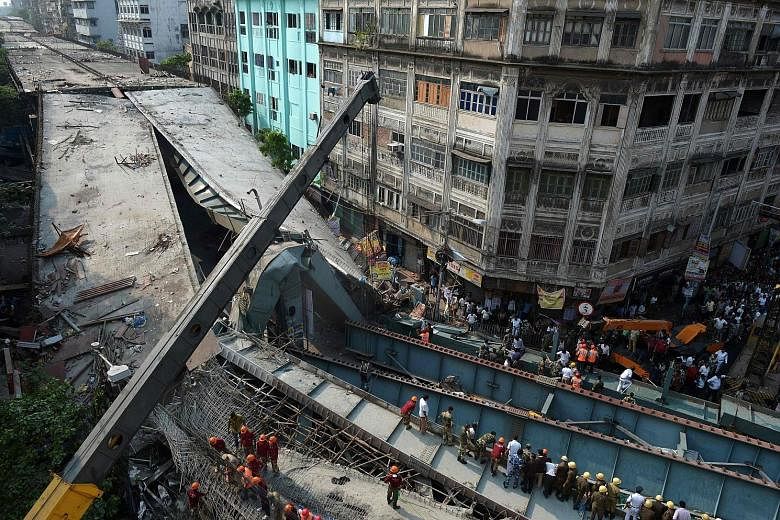KOLKATA (India) • When Ms Sonali Mehrotra realised that a hulking flyover would come within arm's length of her third-floor balcony, she took refuge in black humour, telling relatives to look at the bright side: Instead of lugging suitcases up the stairs when they come to visit, they could toss them into a bedroom as they drove in from the airport.
Work on the overpass occurred so sporadically - generally, when elections were coming - that a project promised in 18 months was unfinished after seven years.
After last Thursday, though, when a 100m slab of steel and concrete slammed down on a street coursing with midday traffic, Ms Mehrotra's sense of humour was gone.
Irritation with the faltering project has turned, for the people who live beneath it, into a sort of focused hatred. Last Saturday, as the remains of a 26th victim were cut free of the metal that had crushed him, a group of residents marched down the street demanding that the structure be dismantled.
"This thing has made our lives hell for the last nine years," said Ms Meena Devi Purohit, 55, a five-term member of the municipal council from the area. Opposition to the project predated the start of construction, in 2009.
It is rare for dysfunctional building projects to get much attention in India, in part because people are so accustomed to them. A local newspaper described Kolkata as "the city of unfinished flyovers", but the phrase could be used for any number of India's largest cities, littered with projects that were launched with fanfare but then proceeded haltingly, or halted entirely.
Some of the reasons emerged last week. Public works projects are launched by politicians for pre-election boosts and lose their urgency once voting is over. Building contracts are often awarded to relatives or associates of political leaders, who can acquire necessary permits but may not be competent builders. Planning is piecemeal. On-site supervision is weak. Safety measures are haphazard. Work on the Kolkata overpass picked up last November, when West Bengal Chief Minister Mamata Banerjee, whose party is competing in legislative elections this month, promised a cheering crowd the road would be open by February.
Among the developments that emerged was that the team that had just laid the concrete on the fallen section worked under Mr Rajat Bakshi, a cousin of the neighbourhood's political kingpin. That man, former legislator Sanjay Bakshi, has reportedly been working closely with Ms Banerjee since the early 1990s. Mr Sanjay Bakshi's wife, Smita, is a legislator with Ms Banerjee's party, Trinamool Congress.
Police have arrested four officials from the contractor in charge of the project, a corporation called IVRCL based in Hyderabad, and on Sunday, Kolkata police said they were seeking to question Mr Rajat Bakshi.
By the weekend, news of the fallen overpass had dropped off the television news. But many residents said fear of another collapse made it impossible to return to their ordinary routines. "We are so shocked, our lives are so disrupted," said Ms Nirmala Sethia, 66.
NEW YORK TIMES

